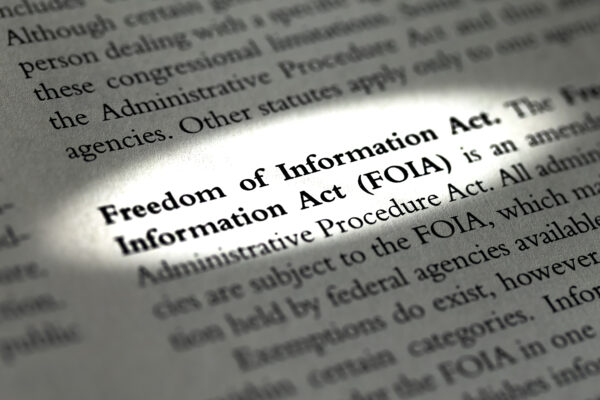When it comes to Michigan’s Freedom of Information Act (FOIA), the law is straightforward and clear: If a request for records held by a government entity is wrongly denied and you successfully sue to obtain it, the government is obligated to compensate your attorneys for the time and expense of litigating the case. This rule, known as “fee shifting,” is universally adhered to throughout the country, in both federal and state courts, in cases involving FOIA laws and civil rights.
So, why is the state of Michigan, in a case being heard by the Michigan Supreme Court on April 4, trying to drastically short-change ACLU cooperating attorneys who joined us in successfully suing the Michigan Department of Corrections (MDOC) on behalf of two independent journalists seeking video of an incident that resulted in the death of an incarcerated person?
We can’t speak to the state’s motivations. What we can say is that the MDOC’s misguided attempts to reduce by 90% our cooperating attorneys’ fees in the case, totaling nearly $200,000, both lacks any legal justification and, if successful, would severely hamper efforts to use FOIA and civil rights laws to hold government agencies and officials accountable.
In doing so, the state is attempting to plow new legal ground that is better left untilled, because the resulting harvest will surely be a bitter one. If the state prevails, it will undermine and radically alter legal practice in Michigan, making it much more difficult to hold government officials accountable and stifle attempts to provide the public with information it has a right to. In short, the state is attempting to remove the very incentives necessary to help ensure FOIA is followed. And that’s dangerous for government transparency, accountability, and ultimately democracy itself.
You’ve probably have heard the old phrase, “No good deed goes unpunished.” In effect, that is what’s happening here. The state is wrongly arguing that, because the ACLU’s cooperating attorneys from the law firm Honigman LLP provided their services on a pro bono basis (meaning for the public good and without asking the clients to pay), those attorneys somehow do not deserve to be fully compensated for going to court and successfully forcing the MDOC to turn over the video footage requested by the journalists—footage that the public is legally entitled to see for themselves.
We are not alone in making this case. A host of other organizations have filed “friend of the court” briefs supporting our position. The organizations include the State Bar of Michigan, Michigan Association for Justice, Michigan State Planning Body, Legal Services Association of Michigan, Disability Rights Michigan, and the Association of Pro Bono Counsel.
In its brief, the Michigan Association of Justice (MAJ), an organization made up of attorneys who routinely represent plaintiffs in cases involving civil rights and government misconduct, made it clear why this is such an important case:
“MAJ is concerned that the decision of the Court of Appeals will also have a chilling affect making it less likely that attorneys will take cases where the illegal act is clear and harmful to society but the economic damages to the individual is minimal, in clear contravention of the … reasons that these statutes include attorney fees to the prevailing plaintiff.”
MAJ and the other organizations supporting our position in the case have it exactly right. If attorneys who provide services pro bono cannot recover fees in successful FOIA and civil rights cases, fewer such cases will be brought, and the public as a whole will suffer.
Background
In 2016, a man incarcerated in a Michigan prison, Dustin Szot, died under what may have been suspicious circumstances. He was allegedly involved in an altercation with another prisoner, and prison guards shocked him with a taser. Spencer Woodman and George Joseph, freelance journalists who report nationally on criminal justice issues, learned that the entire incident was captured on video and requested a copy of the footage under FOIA.
MDOC refused to release the video, claiming that its disclosure would somehow undermine prison security. In 2017, the ACLU of Michigan and our cooperating attorneys from Honigman filed suit on Woodman and Joseph’s behalf, arguing that the state had no legitimate justification for keeping the video secret.
MDOC continued to oppose us throughout litigation, dragging the case out for more than two years. During discovery, we learned that MDOC staff has a policy of automatically denying all FOIA requests for videos, without even viewing the video in question to determine whether or how its disclosure would threaten security.
In 2019, the Michigan Court of Claims ruled that MDOC’s policy was illegal and ordered the state to turn over the video footage, holding that there was no justification for keeping the recordings secret.
However, when it came time to order MDOC to pay attorneys’ fees because our case had been successful, the court slashed the ACLU cooperating attorneys’ fees because the work was being done pro bono. We appealed, but the Court of Appeals refused to overturn the ruling.
Consequently, we are taking this case to the Michigan Supreme Court, which will hear oral arguments in Woodman v. Department of Corrections on April 4.
Dangerous Precedent
By its own admission, MDOC would not have released the video and audio recordings in response to the FOIA requests from Mr. Woodman and Mr. Joseph, and only did so under court order.
If MDOC and other government agencies are allowed to violate FOIA going forward without fear of being responsible for the opposing side’s legal fees, the government’s incentive to adhere to the law is greatly diminished. It will also make it much less likely that people without the means to hire an attorney will be able to have their day in court.
Congress, in enacting the federal FOIA law, highlighted the fact that, too often “the barriers presented by court costs and attorneys’ fees are insurmountable for the average person requesting information, allowing the government to escape compliance with the law.”
The reason for making the government pay attorney fees when it is found to have wrongly withheld information the public is legally entitled to also has a basis in common sense: “If the government had to pay legal fees each time it lost a case . . . it would be much more careful to oppose only those areas that it had a strong chance of winning.”
In this case, Honigman was acting in the highest traditions of the legal profession by
serving as pro bono counsel, in cooperation with the ACLU, on behalf of independent journalists trying to obtain public records the MDOC was unlawfully keeping secret. The litigation took more than two years. Neither Honigman nor the ACLU expected Mr. Woodman or Mr. Joseph to pay for the legal services provided. But that does not eliminate the expectation that, upon prevailing, both entities would be entitled to reasonable attorneys’ fees under FOIA.
If that doesn’t happen, organizations like the ACLU will be severely hampered in their ability to litigate public interest cases if, after years of protracted litigation that uncovers serious violations of state law, cooperating counsel could recover only 10% of their reasonable fees because they did their work pro bono. Likewise, public officials and other defendants in fee-shifting cases would have little incentive to resolve cases efficiently when private counsel are providing their services pro bono if, at the end of the case, the amount that they will owe would be only a fraction of what a reasonable fee would otherwise be.
It is now up to the Michigan Supreme Court to ensure that the shining light that helps keep our government accountable isn’t dangerously dimmed.
Dan Korobkin is legal director for ACLU of Michigan


